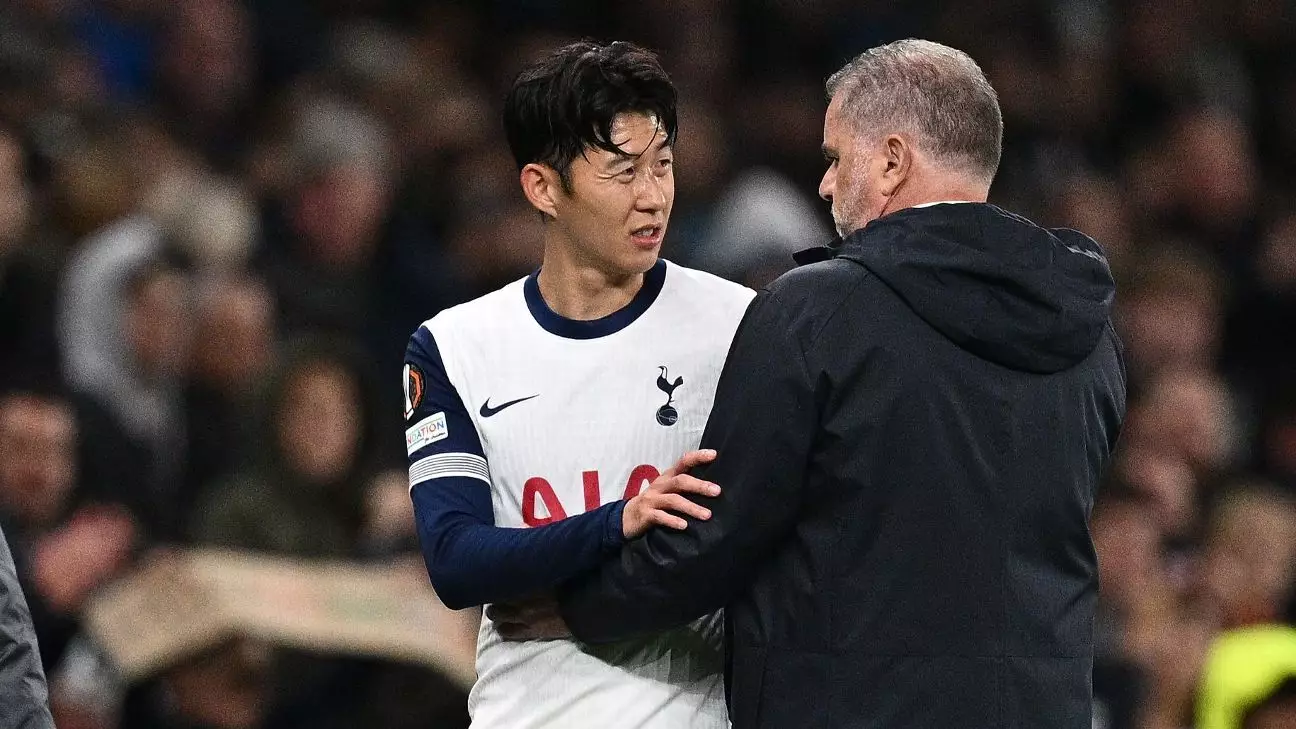As the Premier League season progresses, discussions regarding player fitness, particularly for high-profile athletes like Son Heung-Min, become paramount. Ange Postecoglou, Tottenham Hotspur’s head coach, has recently underscored that the demands placed on players today are unsustainable. This holds especially true for Son, whose contributions to the team are invaluable yet increasingly concerning in light of his age and workload. The current situation depicts not just the physical strain of elite football but the broader narrative of fixture congestion that threatens player longevity.
In modern football, schedules are relentless, presenting a continuous series of matches across various competitions. Son, being Tottenham’s talisman, inevitably finds himself at the forefront of this challenge. With 415 appearances for Spurs since his arrival in 2015, the sheer volume of games has taken its toll. His recent withdrawal from the pitch against Qarabag due to “fatigue in his hamstring” raises questions about the sustainability of his participation in every fixture, especially considering his recent admission about the intense demands of modern football.
Postecoglou’s candid acknowledgment of Son’s fatigue points to a critical issue facing many elite athletes today. They often find themselves torn between personal ambition and the pragmatic need for rest. Son’s passion for the game is apparent, and his commitment to both club and country is commendable. However, this enthusiasm can lead to detrimental consequences if not carefully managed. The coach’s desire to limit Son’s appearances reflects a growing recognition within the sport that players cannot be expected to endure constant participation without facing the risks of injury.
Moreover, Son’s comments about the high stakes associated with excessive game time, where “the risk of injury is massive,” cannot be overlooked. Such insights reflect an ever-present tension within the game: while the call to perform consistently at a high level is ever-present, the health and well-being of the player must take precedence. This balancing act is a complex challenge for any manager, especially when influential players like Son are involved.
Strategic Player Management
Postecoglou’s approach highlights the need for strategic management of player workloads. Despite the pressure to field best-11 lineups, recognizing when to rotate players is crucial for maintaining fitness over a grueling season. In Son’s case, the Tottenham squad has endured multiple injuries to other key players, further complicating the coach’s task of preserving the South Korean captain’s fitness.
There is a stark difference between the expectations placed on younger players and seasoned professionals like Son. While one might assume that experience equates to higher endurance, Postecoglou argues that the modern game’s demands often defy such assumptions. The rapid pace, heightened intensity, and tactical complexities of today’s football can strain even the most experienced players, suggesting that age should not be the sole factor in considering workload.
An intriguing aspect of Son’s situation is his dual commitment—to Spurs and the South Korean national team. Postecoglou’s resolute stance of not asking Son to pull back on international duties reveals a deep respect for the player’s personal aspirations. For Son, representing his country is not merely a responsibility but a significant element of his footballing identity. The decision of whether to ease up on international play ultimately rests with the player, not the management, framing it as a critical part of his footballing narrative.
This perspective necessitates a deeper understanding of athlete psychology, where the desire for legacy and fulfillment runs parallel to the numbers on a fitness report. The notion that players should choose their path based on personal fulfillment rather than solely club demands could usher in a transformative shift in the management of players’ careers.
The discussion surrounding Son Heung-Min encapsulates the nuanced challenges of player management in contemporary football. As the season unfolds, Spurs will have to navigate the logistical enigma of fixture congestion while actively safeguarding the physical integrity of their most influential players. The significance of mindfulness—both in terms of individual player health and long-term team performance—cannot be overstated.
The narrative around Son and his workload is not merely about a player; it reflects broader issues facing elite athletes today. Balancing ambition and well-being will not only shape the careers of stars like Son but may also redefine best practices across the sport, ensuring that player welfare remains paramount in the frantic world of professional football. As such, the decisions made now will resonate well beyond the pitch, influencing the future of athlete management.
